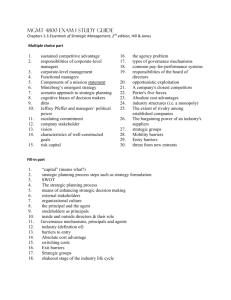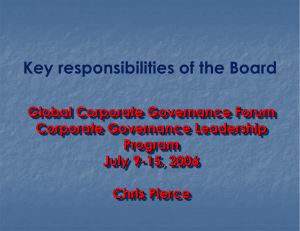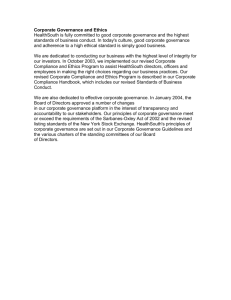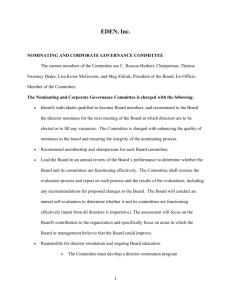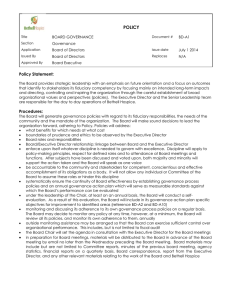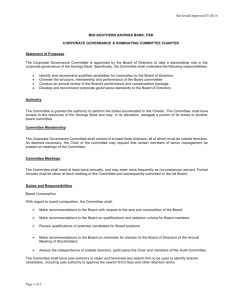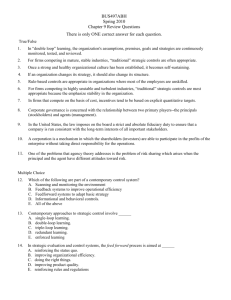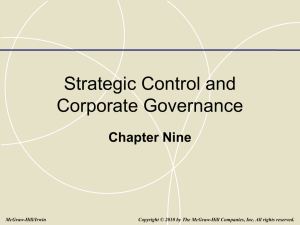Taïeb Hafsi
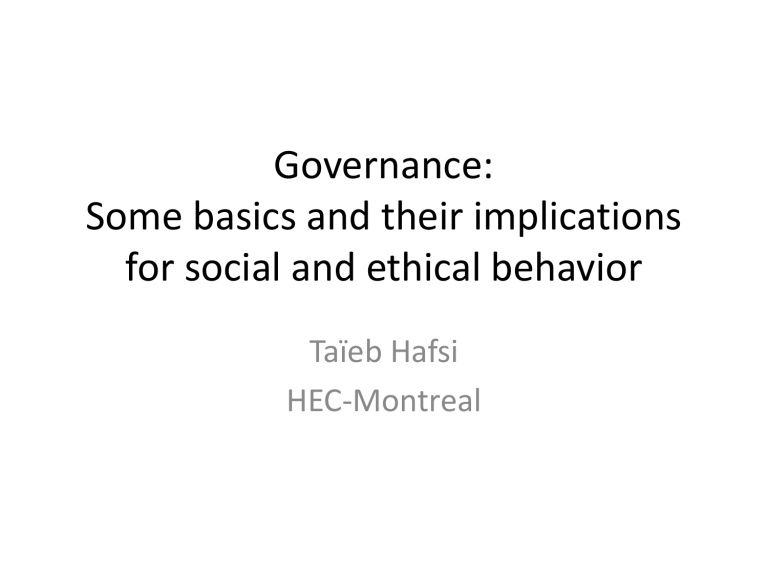
Governance:
Some basics and their implications for social and ethical behavior
Taïeb Hafsi
HEC-Montreal
Agency and governance
• Governance is at the beginning a response to a basic agency problem
– The separation between the principal (owner) and the agent (manager)
– There is information asymetry, and the agent could take advantage of his access to privileged information
(opportunism)
– There is moral hazard when the agent uses information to make decisions that are to his advantage without knowledge of the principal
• Another agency problem is when there are dominant principals who could take advantage of minority ones
Agency and Governance
• Agency theory suggests two solutions:
• Control
– Through an intermediary body: The board of directors
• Independance and competence are critical
• Incentives
– To ensure that agents’ interests are aligned with principals’ interests
Board and management
• Interactions of board and managers determine a firm’s social and ethical behavior
• MANAGERS are likely to be OPPORTUNISTIC
• They are short-term oriented
• Incentives generally push towards shareholders’ concerns: maximization of profits
• Neglect of other stakeholders
• BOARD’s DUAL RESPONSIBILITIES
– Agency theory: Control
– Strategy: Advice
Research Findings and Problems
• The relationship between board composition variables and performance are inconclusive
• E.g., Relationship of independence or gender to financial performance is unclear, sometimes positive, sometimes negative, sometimes not significant
• E.g., Relationship of gender to social performance is generally inconclusive
• Scholars mix variables without realizing that they do not refer to the same thing
• Some are structural variables
• Others are board member characteristics variables
Theoretical Framework
The Role of Board of Directors
Control / Monitor
Agency Theory
Advise / Counsel
Strategy Theories
Structure of the board
Composition of the board
NORMS AND RESEARCH FINDINGS
• BOARD COMPOSITION MATTERS
• American SoX, and European regulations emphasize such important characteristics as:
• A significant number of independent directors
• Leadership duality
• Size of the board
• Ownership by CEO and board members
• These are structural variables or board characteristics
• There are also compositional characteristics such as:
• Gender
• Ethnicity
• Age
• Experience
• Tenure
• These are director-specific characteristics
• TO FIND RELATIONSHIP: RECOGNIZE VARIABLE DIFFERENCES and
GROUP THEM INTO INDICES
Research Findings
• Structure-related variables have no effects !
• Most of the variance comes from director demographics. Consensus is:
• Diversity is positively related to Decision-Making quality
• Diversity is negatively related to Decision-Making speed
• Gender has a nonlinear relationship with performance
• When the number of women is small (tokens) we see no effect
• When the number of women goes beyond some thresshold, it is positively related to both financial and social performance
• When the number of women is large, again no effect.
• In general women and minorities are seen as more sensitive to social issues than traditional majority representatives
DETERMINANTS OF BEHAVIOR
• AN ORGANIZATION’s BEHAVIOR IS INFLUENCED BY ITS
LEADERSHIP
• LEADERSHIP EFFECTS ARE DETERMINED BY BOARD
DIVERSITY
• THE STRUGGLE BETWEEN ETHICS OR SOCIAL BEHAVIOR
AND EFFICIENCY IS ARBITRATED BY THE BOARD
• COMPOSITION IS THE DYNAMIC FACTOR. WHAT ARE
DIRECTORS’ CHARACTERISTICS MATTERS
• BUT…
• STRUCTURE MATTERS ALSO. IT IS AN IMPORTANT
MODERATING FACTOR
BUT… BEWARE OF
JUSTIFICATIONS !
BACK TO THEORY
• STRUCTURE IS RELATED TO AGENCY THEORY
• IT IS GENERALLY EASILY MANDATED BY REGULATORS OR
NORMATIVELY DETERMINED
• BOARD MEMBER PERSONAL CHARACTERISTICS ARE
STRATEGIC AND MAKE THE DIFFERENCE AMONG
ORGANIZATIONS
• E.G., YOUNG ARE MORE ADVENTUROUS AND LONG TERM
ORIENTED, OLD ARE MORE CONSERVATIVE AND SHORT TERM
ORIENTED
• E.G., BOARD MEMBERS’ EXPERIENCE AND KNOWLEDGE ARE
AN IMPORTANT CAPITAL, PROVIDING ACCESS TO NETWORK
AND RESOURCES, AND PREVENTING COSTLY MISTAKES
What about national governance
?
• The issues are the same but complexity makes things more difficult
• PRINCIPALS: POPULATION THROUGH
REPRESENTATIVES ?
• AGENTS: GOVERNMENTS AT ALL LEVELS ?
• PROBLEM 1: HOW TO ASSESS PRINCIPALS’
INTEREST ?
• PROBLEM 2: HOW TO CONTROL AGENTS GIVEN
THE MULTIPLICITY OF LEVELS AND INTRICACIES OF
STRUCTURES ?
FREEDOM OR CONTROL ?
• WE CANNOT ESCAPE THE DILEMMA BETWEEN
FREEDOM AND CONTROL
• FEAR LEADS TO MORE CONTROL
• SEACH FOR EFFECTIVENESS LEADS TO MORE
FREEDOM
• BALANCE IS A DIFFICULT STRUGGLE FOR
CONSENSUS
• MY PREFERENCE IS FREEDOM. IN THE LONG TERM,
IT IS THE BETTER CHOICE IN SITUATIONS OF
COMPLEXITY
